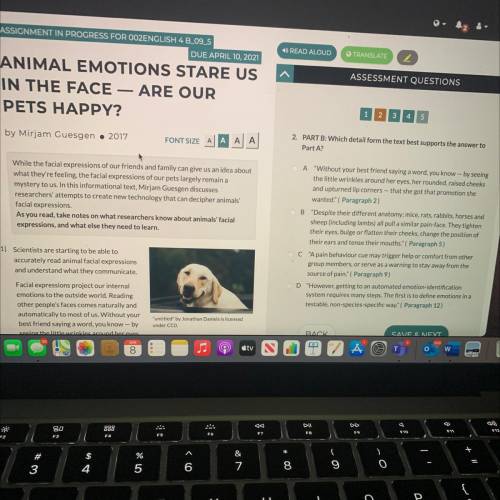els is licensed

English, 08.04.2021 19:10 lerasteidl
2. PART B: Which detail form the text best supports the answer to
Part A?
els is licensed
A "Without your best friend saying a word, you know - by seeing
the little wrinkles around her eyes, her rounded, raised cheeks
and upturned lip corners - that she got that promotion she
wanted." ( Paragraph 2)
B "Despite their different anatomy; mice, rats, rabbits, horses and
sheep (including lambs) all pull a similar pain-face. They tighten
their eyes, bulge or flatten their cheeks, change the position of
their ears and tense their mouths." ( Paragraph 5)
C "A pain behaviour cue may trigger help or comfort from other
group members, or serve as a warning to stay away from the
source of pain." ( Paragraph 9)
D "However, getting to an automated emotion-identification
system requires many steps. The first is to define emotions in a
testable, non-species-specific way." ( Paragraph 12)


Answers: 2


Another question on English

English, 22.06.2019 03:30
In at least one hundred words, explain how the structure of elizabeth bishop’s “sestina” to convey meaning in the poem. provide specific evidence from the text to support your response.
Answers: 3

English, 22.06.2019 06:10
Match each mode of narration to the excerpt in which it is used.
Answers: 2

English, 22.06.2019 06:30
The difference between the present reservoir, with its silent sterile shores and debris-choked side canyons, and the original glen canyon, is the difference between death and life. glen canyon was alive. lake powell is a graveyard. which word best contributes to the author’s sad tone?
Answers: 3

English, 22.06.2019 08:30
Read the passage. when i consider how my light is spent ere half my days, in this dark world and wide, and that one talent which is death to hide, lodged with me useless, though my soul more bent to serve therewith my maker, and present my true account, lest he returning chide; “doth god exact day labor, light denied? ” in line 7 of sonnet xix by john milton, the speaker asks, “doth god exact day labor, light denied? ” what does his question mean? why must god make us suffer to work? what shall one charge god to work in the dark? how does god expect him to work when he is blind? is god trying me?
Answers: 1
You know the right answer?
2. PART B: Which detail form the text best supports the answer to
Part A?
els is licensed
els is licensed
Questions

Mathematics, 12.12.2020 16:40




Mathematics, 12.12.2020 16:40

Mathematics, 12.12.2020 16:40


Arts, 12.12.2020 16:40

Mathematics, 12.12.2020 16:40

Mathematics, 12.12.2020 16:40

Advanced Placement (AP), 12.12.2020 16:40



Computers and Technology, 12.12.2020 16:40

Biology, 12.12.2020 16:40


Biology, 12.12.2020 16:40





